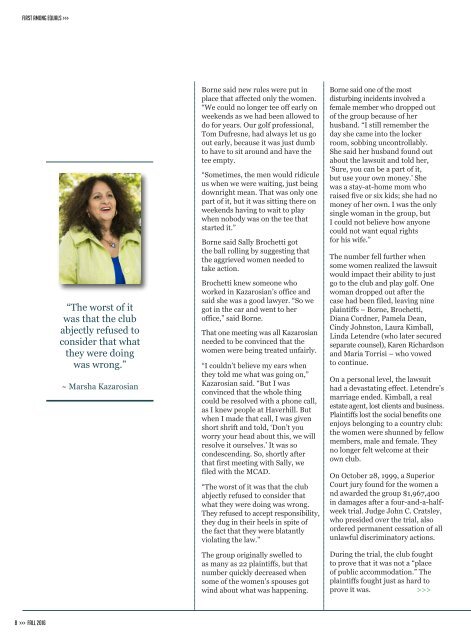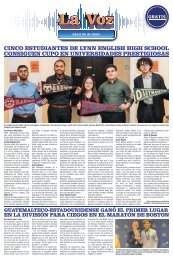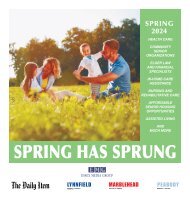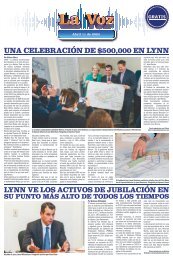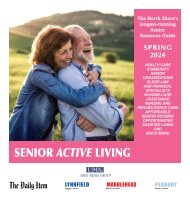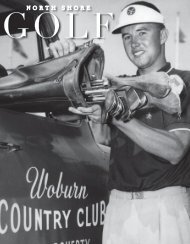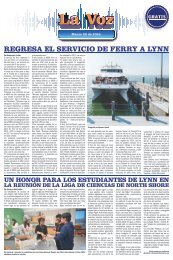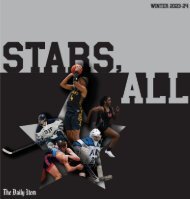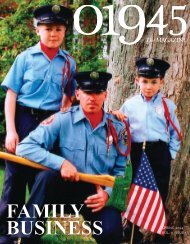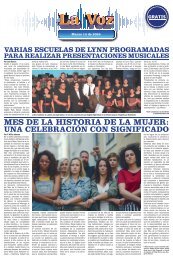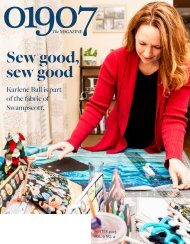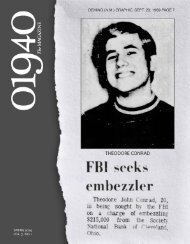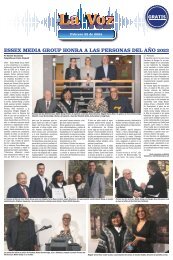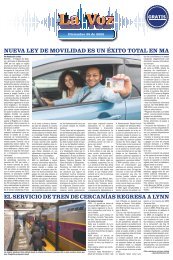North Shore Golf Fall 2016
Create successful ePaper yourself
Turn your PDF publications into a flip-book with our unique Google optimized e-Paper software.
FIRST AMONG EQUALS >>><br />
“The worst of it<br />
was that the club<br />
abjectly refused to<br />
consider that what<br />
they were doing<br />
was wrong.”<br />
~ Marsha Kazarosian<br />
Borne said new rules were put in<br />
place that affected only the women.<br />
“We could no longer tee off early on<br />
weekends as we had been allowed to<br />
do for years. Our golf professional,<br />
Tom Dufresne, had always let us go<br />
out early, because it was just dumb<br />
to have to sit around and have the<br />
tee empty.<br />
“Sometimes, the men would ridicule<br />
us when we were waiting, just being<br />
downright mean. That was only one<br />
part of it, but it was sitting there on<br />
weekends having to wait to play<br />
when nobody was on the tee that<br />
started it.”<br />
Borne said Sally Brochetti got<br />
the ball rolling by suggesting that<br />
the aggrieved women needed to<br />
take action.<br />
Brochetti knew someone who<br />
worked in Kazarosian’s office and<br />
said she was a good lawyer. “So we<br />
got in the car and went to her<br />
office,” said Borne.<br />
That one meeting was all Kazarosian<br />
needed to be convinced that the<br />
women were being treated unfairly.<br />
“I couldn’t believe my ears when<br />
they told me what was going on,”<br />
Kazarosian said. “But I was<br />
convinced that the whole thing<br />
could be resolved with a phone call,<br />
as I knew people at Haverhill. But<br />
when I made that call, I was given<br />
short shrift and told, ‘Don’t you<br />
worry your head about this, we will<br />
resolve it ourselves.’ It was so<br />
condescending. So, shortly after<br />
that first meeting with Sally, we<br />
filed with the MCAD.<br />
“The worst of it was that the club<br />
abjectly refused to consider that<br />
what they were doing was wrong.<br />
They refused to accept responsibility,<br />
they dug in their heels in spite of<br />
the fact that they were blatantly<br />
violating the law.”<br />
The group originally swelled to<br />
as many as 22 plaintiffs, but that<br />
number quickly decreased when<br />
some of the women’s spouses got<br />
wind about what was happening.<br />
Borne said one of the most<br />
disturbing incidents involved a<br />
female member who dropped out<br />
of the group because of her<br />
husband. “I still remember the<br />
day she came into the locker<br />
room, sobbing uncontrollably.<br />
She said her husband found out<br />
about the lawsuit and told her,<br />
‘Sure, you can be a part of it,<br />
but use your own money.’ She<br />
was a stay-at-home mom who<br />
raised five or six kids; she had no<br />
money of her own. I was the only<br />
single woman in the group, but<br />
I could not believe how anyone<br />
could not want equal rights<br />
for his wife.”<br />
The number fell further when<br />
some women realized the lawsuit<br />
would impact their ability to just<br />
go to the club and play golf. One<br />
woman dropped out after the<br />
case had been filed, leaving nine<br />
plaintiffs – Borne, Brochetti,<br />
Diana Cordner, Pamela Dean,<br />
Cindy Johnston, Laura Kimball,<br />
Linda Letendre (who later secured<br />
separate counsel), Karen Richardson<br />
and Maria Torrisi – who vowed<br />
to continue.<br />
On a personal level, the lawsuit<br />
had a devastating effect. Letendre’s<br />
marriage ended. Kimball, a real<br />
estate agent, lost clients and business.<br />
Plaintiffs lost the social benefits one<br />
enjoys belonging to a country club:<br />
the women were shunned by fellow<br />
members, male and female. They<br />
no longer felt welcome at their<br />
own club.<br />
On October 28, 1999, a Superior<br />
Court jury found for the women a<br />
nd awarded the group $1,967,400<br />
in damages after a four-and-a-halfweek<br />
trial. Judge John C. Cratsley,<br />
who presided over the trial, also<br />
ordered permanent cessation of all<br />
unlawful discriminatory actions.<br />
During the trial, the club fought<br />
to prove that it was not a “place<br />
of public accommodation.” The<br />
plaintiffs fought just as hard to<br />
prove it was. >>><br />
8 >>> FALL <strong>2016</strong>


